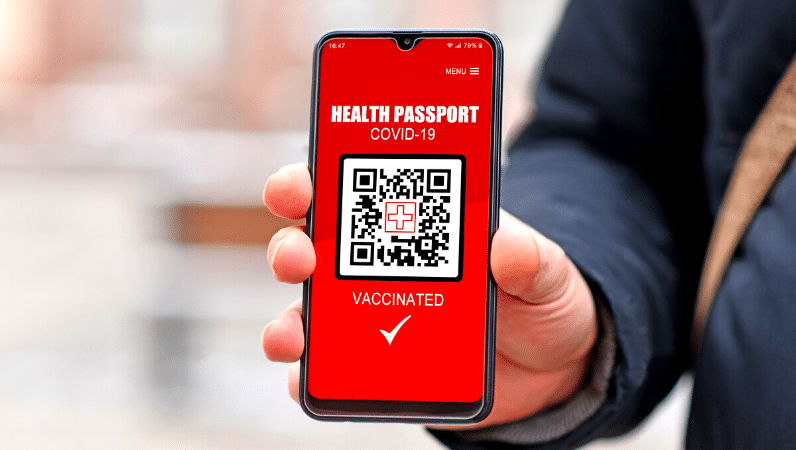Today, the Department of Health in Northern Ireland have released a Covid-19 vaccine passport for domestic use by expanding the scope of the existing COVIDCert NI app, which was previously used for travelling abroad only.
In a previous Citizen Journos article “NI Politicians join the call for Vaccine Passports – Why?” we responded to the calls being made by politicians, primarily leaders and members of the SDLP and Alliance Party, by reviewing the evidence to see if the vaccine passport would be an effective public health measure. This included looking at the Covid situation with our neighbours, The Republic of Ireland, who introduced their own vaccine passport in July. The data quite clearly showed at that time (24/09/2021) that neither the vaccines nor, in Ireland’s case, the vaccine passports were driving down transmission rates.
So, what is the situation now, just over a month further down the line?
According to the NI Covid-19 Vaccination Dashboard, the up-to-date vaccination situation is this:
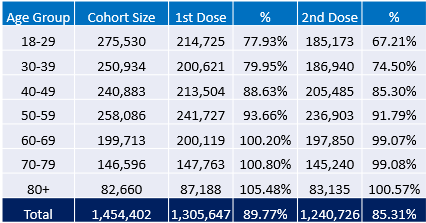
Overall, based on the population estimates, 89% have received their first dose, and 85% have received their second. The over 50 age groups are all above 90% for receiving both doses, so the release of a vaccine passport can be presumed to be targeting the younger age groups, particularly 18-29 & 30-39, to drive uptake of the vaccines.
To apply pressure such as this, to remove social freedoms from people who have decided they don’t want to take any of the new Covid-19 vaccines for various reasons, there must be a benefit. The potential benefits we hear about the most are protecting the individual, helping to reduce transmission rates and protecting the health service from becoming overwhelmed.
We know that Covid-19 has the worst effects on the older age groups, and people with underlying health conditions. They have all been offered vaccination, and in the older age groups, the uptake has been extremely high. The Department of Health’s Covid dashboard contains the Covid data for Northern Ireland since the beginning of the pandemic. Let’s take a look at the statistics for the month of October 2021:
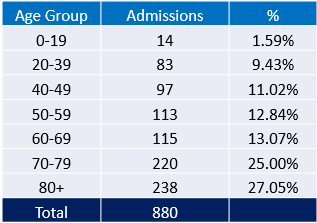
There were 880 total admissions with Covid-19 in October, and only 194 of those were in the under 50s, just over a fifth, which suggests the younger age groups are not greatly contributing to pressure on the health service, and result in much lower frequency in requiring hospital treatment than the older age groups. A similar picture in seen in the cases which sadly result in deaths:
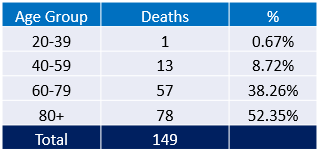
Of the 149 with Covid deaths in October, just one death in the under 40s age group, with over 90% of deaths being in the over 60s. It is clear, looking at these statistics, that the people being targeted with the vaccine passports are themselves generally not at great risk from Covid.
How about reducing transmission? Anecdotally we likely all know people who are double vaccinated and are becoming infected with Covid and experiencing symptoms. Northern Ireland’s own Eamon Holmes, being a recent celebrity example. Public Health England publishes a weekly Covid-19 Vaccine Surveillance Report, which contains some very revealing statistics:
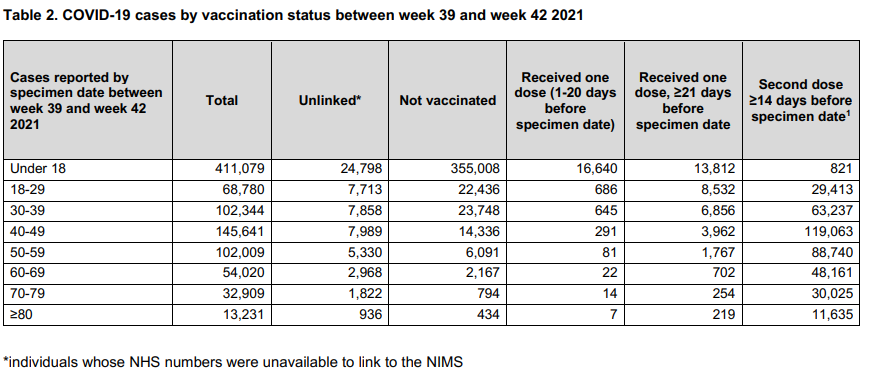
Except for the Under 18’s, which at present has a low vaccination uptake, every age group has significantly higher case numbers in the vaccinated columns, than in the unvaccinated. The vaccines are clearly not preventing transmission of Covid.
Confirming your Covid status to get into certain events in Northern Ireland has been in operation for the past few months. We submitted a Freedom of Information request to the Public Health Agency in relation to the Feile an Phobail festival, which ran from the 5th to 15th August 2021, and the Belsonic events from 17th to 19th September 2021. Both these events had the following entry requirements:
- Proof of a negative NHS Lateral Flow Test taken no more than 48 hours prior to your arrival at the event you are attending; or
- Proof of natural Covid antibodies based upon a positive NHS PCR test within 180 days of the event you are attending (including 10 days self-isolation following the result); or
- Proof of double vaccination – (With the second dose at least 14 days prior to the event you are attending)
In our Freedom of Information request, we asked:
- The numbers of positive COVID cases recorded as having occurred at
or associated with the Fiele an Phobail event that ran from the 5th
August to 15th August 2021 in Belfast. - The numbers of positive COVID cases recorded as having occurred at
or associated with the Emerge event that took place in the Ormeau Park,
Belfast on the 17th September 2021.
The Public Health Agency responded:
PHA records show a total of 114 cases where people advised they had attended Feile an Phobail – 35 cases on 8 August; 18 cases on 14 August; and 61 cases on 15 August.
PHA records show a total of 43 cases where people advised that they had attended a Belsonic event between 17-19 September. This is not broken down to each date, so we cannot confirm that every case attended the Emerge event on 17 September.
The data cannot be read as confirmed transmission within the setting itself. Other factors should be considered, including the possibility of car
sharing to venues, pre- and post-event activities which could also be considered as places for transmission to occur.
As the PHA correctly states, this isn’t confirmation these Covid cases were caught at either of the events. However, it does confirm that people were able to gain entry whilst Covid positive, despite the entry criteria being in place.
Covid vaccine passports will likely become a mandatory requirement for entry into hospitality and other entertainment venues this winter, the timing of the release of the passport today, in the weeks leading up to when Christmas parties are due to commence, is very convenient to increase the pressure on people who are yet to be vaccinated. We have also been advised that confirming your Covid status will be a requirement to enter the Belfast Christmas Markets this year. The Department of Health allocated £10.5 million on the development of the vaccine passport infrastructure, to spend such a large sum of public funds on the scheme shows the intent that it will not simply be optional, or that it is temporary.
For a vaccine passport to be effective in preventing transmission, first the vaccines it is based upon need to be effective in preventing transmission. The evidence in the data clearly shows that they are not. The politicians and the Department of Health who are determined to roll them out must know this, yet they are pressing ahead regardless.
This will create a two-tier society in Northern Ireland, the vaccinated free to do what they wish, the unvaccinated with restrictions on their social freedom, despite both groups being able to catch and transmit Covid.
Covid will still spread amongst the vaccinated population, there is no doubt about that. The introduction of vaccine passports gives us this message – It is okay to catch Covid from a fellow vaccinated person, but it is not okay for it to be caught from someone who has chosen to be unvaccinated.
This is about coercion and pressure. Join the vaccinated club, and download your medical digital identification to show as evidence to go about your normal daily life. We’ll finish with a tweet from the justice minister, Naomi Long, in which she admits precisely this:
